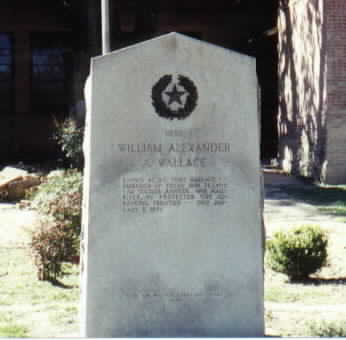

| Leticia Macias | Spring 2001 |
| History 1302 | Hines |
"FOUNDING FATHERS": Bigfoot is a small Texas town located at the intersection of Farm Roads 462 and 472, 18 miles from Pearsall in Frio County near Devine. The town was founded in 1865 by Bob Connelly. Back then it was called Connelly's Store. There they had a gin and mill that was established by D.T. Winters in 1880. The population by 1890 was about 40 people and 146 in 1903. James Connelly secured a post office in 1882 and designated the name Bigfoot for William Alexander Anderson (Bigfoot) Wallace. Wallace was a resident of the community.
ORIGINS: The majority of the people who lived in Bigfoot during the late 1800's were white, of mostly Irish and English descent. The wealthy people are the white population and they live on the main street where the post office and the museum is located. The other people live in smaller homes in other areas. Religion is a big part of the town. The majority of the people are Catholics or Baptist. People in Bigfoot are very eager to talk to people visiting the town. They love to tell stories about Bigfoot Wallace and of their town. Most people know each other since it is a very small community. Every one there helps each other out when maintaining the town.
ECONOMY: The town did not continue to grow much because the Northern Pacific just missed Bigfoot. The railroad expanded its main lines through Devine and Pearsall. This expansion took place in the 1880's with a railroad now called the Missouri Pacific. Bigfoot was so small that they only had a population of 25. In 1903 there were more businesses there than today, but most of the business section of Bigfoot burned down in that year. The population that had grown to an estimated 146, had then dropped to about 100 people by the 1930s. By 1906 there were three general stores, a drug store, blacksmith shop and also a few churches. Bigfoot was a rich farming section that was cutting about 1,000 gin bales of cotton annually. In the 1940s the town then grew again and had a church, a school, five businesses, and a number of scattered dwellings. These businesses made the town grow again to an estimated 210 people, thanks to the oilfield to the south. Now in the 1980s Bigfoot still has a post office, two businesses, and three churches. Bigfoot was never a stable town when it came to the number of people that lived in that area. Many of the people now work in the city. Most people work with the oil pumps, trucking, ranching, livestock, and farming. Back then many people worked in the cotton mills. Most of the people who work the outdoor jobs, are mainly of Hispanic origin. The town does not have a set government or city council.
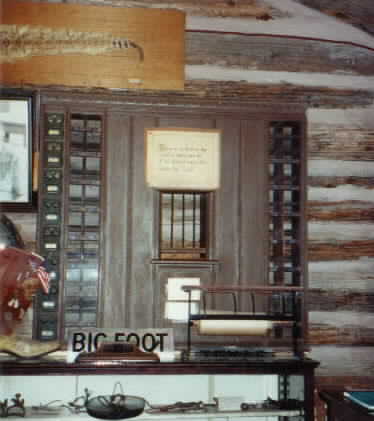 HISTORICALLY SIGNIFICANT STORIES: There is a tale of how Bigfoot, Texas got its name
according to Harvey, a citizen of Bigfoot, "Wallace had promised to teach two young girls how to chew
chewing tobacco for 10 cents. The girls lost their money on the way to Wallace's cabin, so Wallace
took out a piece of cardboard and wrote on it "B F W. 10 cents" at the same time the postman was
looking for a name for the town, he saw the cardboard and the name stuck." Other people believe
that the name came from an Indian who had big feet. He was a troublemaker and would steal horses
and livestock. He stood 6'7" tall and weighed 300 lbs. The truth about Wallace was that two years
after the Texans declared their Independence from Mexico Wallace came to Bigfoot to avenge the death
of his brother Samuel and his cousin. They were shot in the Goliad Massacre of 1836 after they
surrendered. Bigfoot quoted "I will take pay out of the Mexicans" That was his purpose of his
arrival into what is now Bigfoot"
HISTORICALLY SIGNIFICANT STORIES: There is a tale of how Bigfoot, Texas got its name
according to Harvey, a citizen of Bigfoot, "Wallace had promised to teach two young girls how to chew
chewing tobacco for 10 cents. The girls lost their money on the way to Wallace's cabin, so Wallace
took out a piece of cardboard and wrote on it "B F W. 10 cents" at the same time the postman was
looking for a name for the town, he saw the cardboard and the name stuck." Other people believe
that the name came from an Indian who had big feet. He was a troublemaker and would steal horses
and livestock. He stood 6'7" tall and weighed 300 lbs. The truth about Wallace was that two years
after the Texans declared their Independence from Mexico Wallace came to Bigfoot to avenge the death
of his brother Samuel and his cousin. They were shot in the Goliad Massacre of 1836 after they
surrendered. Bigfoot quoted "I will take pay out of the Mexicans" That was his purpose of his
arrival into what is now Bigfoot"
.jpg)
Gunfight: This from Patricia Clayborn, great Granddaughter of Buchanan (Buck) Claiborne, who was killed in the gunfight and is buried in the Longview Cemetery near Bigfoot
"In the back of a very old Claiborne family Bible, a torn and tattered newspaper article from 1886 recounted the gunfight. However, the bottom of the article was worn away, and the name of the newspaper and the exact date of its publication were not present. Here is how the gunfight and the newspaper article were described to me by Harold Claiborne of Coleman, Texas:
"John W. and Buchanan were killed and Patrick Henry was gravely injured in a dispute over the building of a fence in south central Texas in 1886. The exact location is not known for sure. James Earnest Claiborne, Patrick Henry's son related to me, Harold Claiborne, that the incident occurred in Caldwell Co. My mother, Carmel Harmon Claiborne, was alive in 1994. When asked by me where this happened she replied 'Down around San Marcos.' The man that contracted to have the fence built was named L. E. Johnson. The Texas Census for 1880 shows four L. E. Johnsons. They were in Bell County, Caldwell County, Comanchee County, and Erath County. It is suspected the one in Caldwell County is the one in the paper clipping." The following is what can be read of a newspaper clipping found in James Thomas Claiborne Jr's bible by his grand-daughter Martha Suzzy Stroud after his death:
"A Desperate Shooting Affray Two Men Killed and Two Men Wounded"
On last monday evening- July 19th. about an hour by sun a desprate shooting affair occurred
in the northe west part of the county between Jim, Tun, Ben, Doc Winters, and John, Buck and
Pat Claiborne in which John Claiborne was killed dead on the spot, his brother Buck shot
so bad that he died on the following Thursday; Pat shot through the left shoulder; and Doc
Winters shot in the side, the ball passing around and lodging in his back. As near as we could
learn facts were briefly as follows: Some time before the shooting Mr. L. E. Johnson had let
the contract to build a certain portion of the Abbey pasture fence to the Claibornes and after,
hearing or believing, that they had thrown up the contract, let it to the Winters boys. The
Claibornes had already cut out about a mile of the right-of-way for the fence and were still
cutting on the Monday spoken of. The Winters boys began on this Monday in the cut out
right-of-way to dig holes and set posts. The Claibornes heard they were down there at work and
in the evening on their way home went by where they were. Dick Ellis, his boy Bill Ellis, and
another boy Charlie Linney were with the Claibornes. When the Claiborne Party reached the
Winters_____________ two boys Bill Ellis and Charlie Linney did not stop but___________n John
and Buck Claiborne________ ie in advance of Dick___________________
Claibornes coming___________________down smoking. Two_________________up and went to
where________________were laying on the side_________"
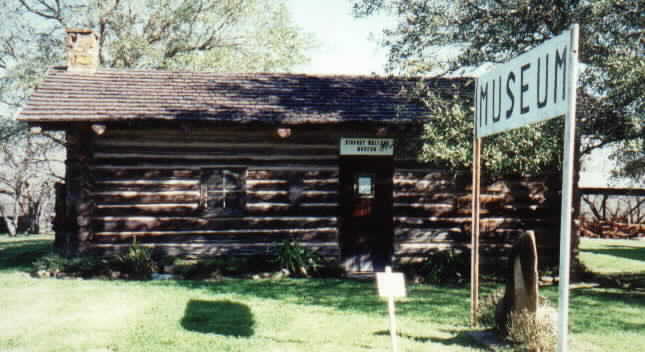 LANDMARKS:
Bigfoot, Texas is a very small town, but it has a very significant building there,
the Bigfoot museum. The musuem was built as a replica of Bigfoot Wallace cabin. The
museum was established in 1957. The founder of the museum was John Bunyan Blackwell.
Inside the museum there are many artifacts of things given to the museum by other people.
The artifacts that are in the museum are such as old grade agendas teachers used for
their students, guns that were used in the revolution with Mexico, old sewing machines,
typewritters, cotton mill machines and other documents on Wallace and the museum.
They also have very old pictures of the residence. Right next to the museum, there is a
replica of where the Declaration of Independance was signed in Austin on March 2,1836.
The replica was built in 1953. It cost $3600. An oak board was about $1.00-$2.00, pine
boards were about $3.00, bundle shingles (heavy) were $5.00, doors were $10.00 a keg of
nails was $15.00 and windows were $20.00. It is run by people of the community. At
this time Dorris Harvry is the one in charge of opening the doors for the visitors.
The museum opens only the second Saturday of the month, unless requested otherwise.
They keep a log of all the people who visit the museum. This is the most historical
building in Bigfoot, Texas.
LANDMARKS:
Bigfoot, Texas is a very small town, but it has a very significant building there,
the Bigfoot museum. The musuem was built as a replica of Bigfoot Wallace cabin. The
museum was established in 1957. The founder of the museum was John Bunyan Blackwell.
Inside the museum there are many artifacts of things given to the museum by other people.
The artifacts that are in the museum are such as old grade agendas teachers used for
their students, guns that were used in the revolution with Mexico, old sewing machines,
typewritters, cotton mill machines and other documents on Wallace and the museum.
They also have very old pictures of the residence. Right next to the museum, there is a
replica of where the Declaration of Independance was signed in Austin on March 2,1836.
The replica was built in 1953. It cost $3600. An oak board was about $1.00-$2.00, pine
boards were about $3.00, bundle shingles (heavy) were $5.00, doors were $10.00 a keg of
nails was $15.00 and windows were $20.00. It is run by people of the community. At
this time Dorris Harvry is the one in charge of opening the doors for the visitors.
The museum opens only the second Saturday of the month, unless requested otherwise.
They keep a log of all the people who visit the museum. This is the most historical
building in Bigfoot, Texas.
EVENTS: Every year the small town of Bigfoot, Texas celebrates the birthday of William A.A. Wallace (also known as Bigfoot). Wallace was born on April 3, 1817. His birth place was in the community of Rockbridge County in Lexington, Virginia. The small community in Bigfoot gets together on this day to reminisce the history of where their town name came from. The festival takes place in front of the museum, there they have a big birthday cake and refreshments to give to the people that visit the museum. Outside they had memorabilia about the town. The celebration is also focused on the Pony Express Ride. The pony rider goes along the Camino Real trails and into Bigfoot, Texas. The people who live there and also the people who are visiting eagerly await for the pony rider to make their quick appearance into the town. When the pony rider arrived, she had a proclamation for the town that declared the month of April a national honorable Pony Express month. The proclamation came from Texas Governor Rick Perry. The Pony rider handed the proclamation to the postmaster Bonnie Anderson, as she read it to the people that gathered around, the Pony rider trailed off to the next destination.
CONNECTIONS TO COURSE THEMES: (TECHNOLOGICAL CHANGE, RACE, IMMIGRATION, ETC.)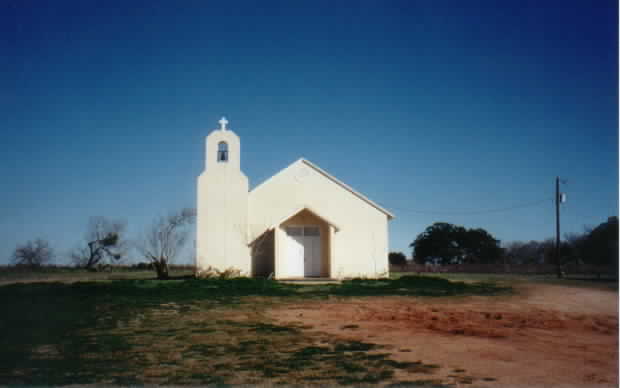
Right in front of the museum is the alternative school. The school was said to be one of the best country
schools in south Texas. In the 1890s citizens opened a public school. By 1907 the school had 105 pupils
and three teachers. The school spirit was a very positive one in those years. Children would be involved
with extracurricular activities. The school had its own Bigfoot School Song "Bigfoot forever, forever and ever
our aims are high aims here a Toast to Bigfoot High School, here's to the gold, to purple enfold, here's to
old Bigfoot, forever our Bigfoot High." Eventually the school closed down and was used as storage for the
museum. After a few years the school reopened it back to normal. Students from Bigfoot get picked
up by a bus and taken to the nearest school in Devine. The kids who go to Bigfoot school are the children
who have a problem with behavior. If they want to play any kind of sport, then they have to go to a nearby
recreational park. Children back in the older years seemed to make better grades than students now.
The community center is now also used for reunions, parties, and showers. Outside they have a monument
of Bigfoot Wallace gravesite. This is there in memory of Bigfoot. many years ago Lackland AFB
took over to Bigfoot, a jet T133 and parked it in the very front. Eventually LAFB would have to take their
jet back to LAFB when the school was to be in service again.
The Catholic church is located down the road from the museum, the school, and across the street
from the post office. The church is a small building but it fills its room with the towns big beliefs in their
religion. The church is in walking distance for many residents. There is also other churches in the Bigfoot area
that are Baptist.
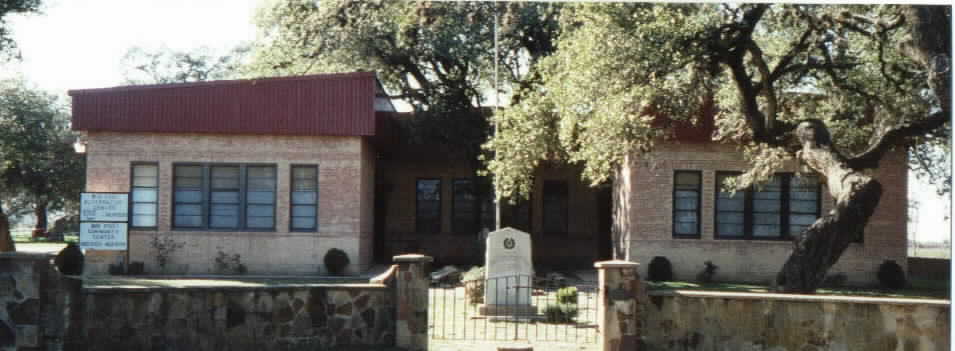

When interviewing the people from Bigfoot I came across an individual by the name of Dathan Brown who talked to me about the history of the town. I asked about medical facilities and where they were located. His reply was that there are not any hospitals nearby or doctors offices or any kind of medical attention for the people his reply was that the nearest loacation would be in Devine or Jourdanton and into San Antonio. In the late 1800s and early 1900s people would die because of lack of medical attention. Babies were born and died on the same day because of complications and no doctor to care for them. Many occassions the mother would also die when giving birth because there were no doctors or hospitals near. Dathan also pointed that many of the residence now have party lines in their homes. It is usually shared by three families. The way they know whose line is ringing is by the tone of the ringer. Some ringers are longer than the others They just have to know which is theirs. The town does not even have cable connection that run that way. It has only been about four or five years since they have had running water connections that come from Medina County. Wells were their source of water. As for entertainment, there really is nothing out there that would be considered entertainment. Most people go into the city to do anything entertaining.
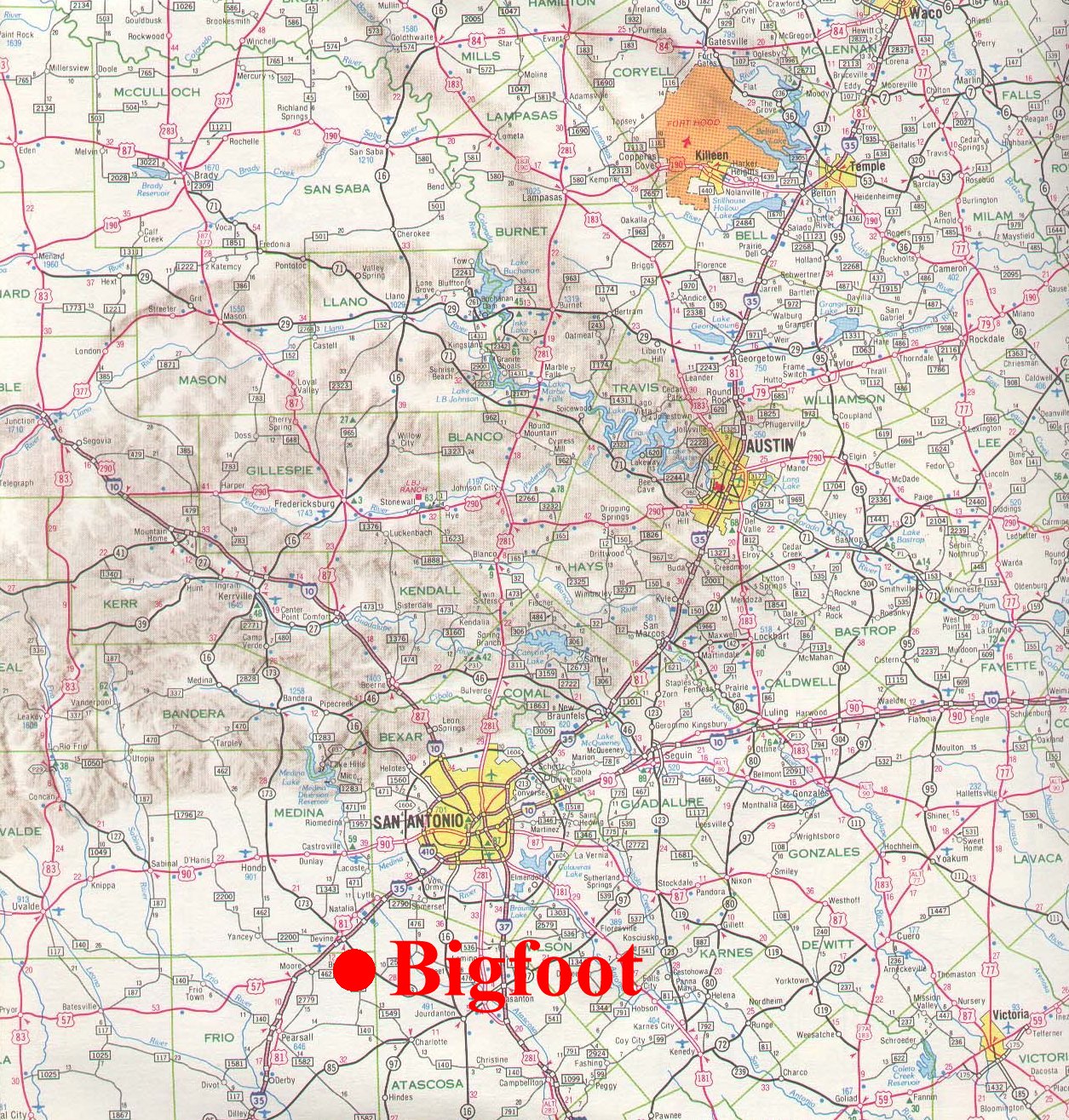
WEBSITES:
BIBLIOGRAPHY:
Source name: Dorris Harvey(museum keeper)
Source Name:Interview with Dathan Brown(Harveys Grandson)February & April 2001
Source Name: Bonnie Anderson(Postmaster)Information April 2001
"The Handbook of Texas"on Bigfoot, texas www.tsha.utexas.edu/handbook/online.com
"The Handbook of texas"on Bigfoot Wallace www.tsha.utexas.edu/handbook/online/articles.com
Morris Press. Heritage Market Trail Cookbook. 1991 Market Trail Task Force. Kearney, NE